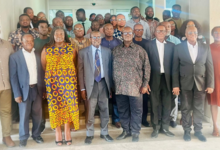Economy back on recovery
The Ghanaian economy is on the right path to recovery after serious economic difficulties as a result of the COVID-19 pandemic and the unprecedented global turbulence, Mr Ken Ofori-Atta, Minister of Finance, has said.
He said the economy was confronted by major external shocks coupled with domestic vulnerabilities triggered by credit rating downgrades, tightened domestic financing conditions, and increased cost of borrowing.
Presenting the mid-year fiscal policy review of the 2023 budget statement and economic policy of the government in Parliament yesterday, the Minister said the measures instituted by the government to address the negative impacts were beginning to yield the needed results.
The measures including fiscal adjustments and investment in people according to the Minister have resulted in stabilising fluctuating exchange rates, softening inflation, and bringing down interest rates.
“The implementation of ongoing fiscal adjustments and sustained investments in our people have contributed immensely to the stabilisation we are seeing in the economy,” he said.
He said, “The exchange rate has stabilised, inflation has softened, and interest rates have declined since December 2022, and private investments have been announced due to increased investor confidence in our economy.”
The government he said had successfully negotiated the US$3 billion 3-year IMF-ECF Programme, which was approved in May this year to support the implementation of the government’s Post-COVID-19 Programme of Economic Growth.
The Finance Minister said the government also developed a framework for the V20 Climate Prosperity Plan to attract climate investments from the private sector.
“These achievements have been with the support and commitment of this House and the Ghanaian people. It demonstrates that when we speak with one voice, we can achieve what we set our minds to do- Genesis 11:6- “If as one people speaking the same language, they have begun to do this, then nothing they plan to do will be impossible for them,” he said.
Mr Ofori-Atta said for the first six months of the year, the country continued to make progress by exceeding non-oil revenue targets for the year.
“We have seen improvements in nonoil tax revenue collection despite some noticeable shortfalls in Value Added Tax. However, oil revenues have fallen short of expectations due to changes in global prices,” he said.
To this end, the Minister said “We will, therefore, undertake a downward review of the oil-related revenue as well as the corresponding expenditures to align with the underperformance of some of our revenue handles. Specifically, this will impact the Annual Budget Funding Amount (ABFA).
“This ‘turning the corner’ is underpinned by the investments and sacrifices we have collectively made during this difficult period since March 2020,” he said.
He also said the government committed to working to sustain the improvement in the economy to ensure that prices of goods and services are within the budget of citizens.
“Ordinarily, Mr Speaker, these positive trends should ease the burden on our pockets. As a Finance Minister and a family man myself, I will continue to work hard to build and sustain a favourable macroeconomic environment, and remain confident that the prices of goods and services would reflect the trend for all of us – for our families and enterprises.”
Mr Ofori-Atta further hailed the government’s Domestic Debt Exchange programme which he said provided “the government with increased fiscal flexibility and addressed cash and other liquidity constraints. Once again, we are grateful to all investors who participated in this exchange.”
He thus urged the citizenry to support the government in its quest to protect and restore the economy.
BY DAVID ADADEVOH





